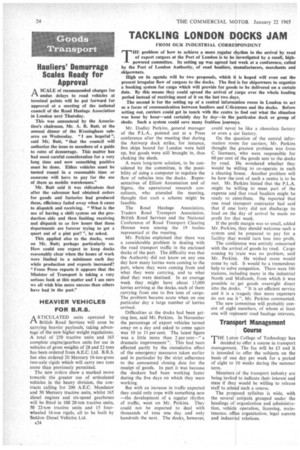TACKLING LONDON DOCKS JAM
Page 26

If you've noticed an error in this article please click here to report it so we can fix it.
FROM OUR INDUSTRIAL CORRESPONDENT
THE problem of how to achieve a more regular rhythm in the arrival by road of export cargoes at the Port of London is to be investigated by a small, high
powered committee. Its setting up was agreed last week at a conference, called by the Port of London Authority, of road hauliers, manufacturers, merchants and shipowners.
High on its agenda will be two proposals, which it is hoped will even out the present irregular flow of cargoes to the docks. The first is for shipowners to organize a booking system for cargo which will provide for goods to be delivered on a certain date. By this means they could spread the arrival of cargo over the whole loading period instead of receiving most of it on the last two days,
The second is for the setting up of a central information room in London to act as a focus of communication between hauliers and C-licensees and the docks. Before setting out, carriers could get in touch with the centre to find out what the situation was hour by hour—and certainly day by day—in the particular dock or group of sheds. Such a system could save many fruitless journeys.
Mr. Dudley Perkins, general manager of the P.L.A., pointed out at a Press conference after the meeting that during the Antwerp dock strike, for instance, five ships bound for London were held up, but goods were still brought in, thus choking the sheds.
A more long-term solution, to be considered by the committee, is the possibility of using a computer to regulate the flow of vehicles into the docks. Representatives of Elliott' Automation and of Sigma, the operational research consultants, who attended the meeting, thought that such a scheme might be feasible.
The Road Haulage Association, Traders Road Transport Association,• British Road Services and the National Conference of Road Transport Clearing Houses were among the 19 bodies represented at the meeting.
Mr. Perkins explained that there was a considerable problem in dealing with the road transport traffic in the enclosed docks of the port. The difficulty was that the Authority did not know on any one day how many lorries were coming to the port, where they were corning from and what they were carrying, and to what shed they were destined. In an average week they might have about 15,000 lorries arriving at the docks, each of them carrying from one to five tons of cargo. The problem became acute when on one particular day a large number of lorries arrived.
Difficulties at the docks had been getting less, said Mr. Perkins. In November the percentage of export vehicles turned away on a day and asked to come again was 10 to 11 per cent. The latest figure was a little more than 2 per cent—" a dramatic improvement ". This had been effected partly by the cumulative effect of the emergency measures taken earlier and in particular by the strict adherence to the announced closing date for the receipt of goods. In part it was because the dockers had been working faster during the five days on which they were working.
But with an increase in traffic expected they could only cope with something new —the development of a regular rhythm of traffic, went on Mr. Perkins. They could not be expected to deal with thousands of tons one day and only hundreds the next. The docks, however,
could never be like a chocolate factory or even a car factory.
On the question of the central information room for carriers, Mr. Perkins thought the greatest problem was from C licensees, who were responsible for 60 per cent of the goods sent to the docks by road. He wondered whether they would be willing to co-operate in such a clearing house. Another problem will be how the cost of such a centre is to be met. Mr. Perkins hinted that the P.LA. might be willing to meet part of the expense and that road hauliers might be ready to contribute. He reported that one road transport contractor had said that if one lorry did not discharge its load on the day of arrival he made no profit for that week.
If the profit margin was so small, added Mr. Perkins, they should welcome such a system and be prepared to pay for a facility that would turn foss into profit.
The con f er en ce was entirely concerned with the arrival of goods by road. Cargo coming by train was no problem, said Mr. Perkins. He wished more would come by rail. It would be a tremendous help to solve congestion. There were 166 stations, including many in the industrial North and Midlands, from which it was possible to get goods overnight direct into the docks. "It is an efficient service and it is a tragedy that more exporters do not use t ", Mr. Perkins commented.
The new tommittee will probably consist of eight members, of whom at least one will represent road haulage interests.




















































































































